Pseudomonas – PHA update 8th February 2012

As a precautionary measure, a water sampling and tap replacement programme is underway in all neonatal units in Northern Ireland. PHA is publishing water sample results for all Trusts as and when confirmed.
Water sample results for the Southern Trust and the Western Trust show that Pseudomonas has been detected in a small number of water outlets in the neonatal units at Daisy Hill, Craigavon and the Erne hospital.
As in all neonatal units, steps had already been taken to ensure that babies are not coming into contact with the water supply. Only sterile water is being used for direct care of babies and a range of very strict infection control measures are also in place.
No babies in these hospitals are currently infected with Pseudomonas. There are currently two babies in Craigavon neonatal unit who are colonised i.e. they have Pseudomonas on their skin but are not infected, and it is not having any effect on those babies. No babies in Erne Hospital or Daisy Hill Hospital’s neonatal units are colonised.
The Trusts have informed parents of babies currently in the units of the water results.
In addition to the normal robust infection and control measures which hospitals are required to have in place, as a precautionary measure, taps in all neonatal units in Northern Ireland are being replaced and other remedial action will be taken as required. It is important to re-emphasise though, that babies are not coming into contact with the water supply.
It is not clear at this stage exactly what the implications are of finding Pseudomonas in water supplies and what longer-term monitoring is required. National guidance is being developed urgently for the whole of the UK, with experts taking account of all of the scientific evidence available, including the evolving situation in Northern Ireland.
The PHA is continuing to work with all Trusts by providing advice on infection prevention and control measures.
The PHA wishes to re-emphasise that effective infection control for all staff and visitors to neonatal units is vital. It is also important that the public continues to follow good hygiene practice when visiting hospitals. In particular, parents of babies in neonatal units must wash and dry their hands thoroughly and use an alcohol rub before they touch the baby or babies’ equipment
The neonatal network continues to manage well.
Photo Credit: Janice Haney Carr. Content Providers(s): CDC/ Janice Haney Carr.
1. On Saturday 28th January, the Department of Health, Social Services and Public Safety issued further guidance to the Trusts on dealing with Pseudomonas in neonatal units. The interim guidance, developed in conjunction with the Health Protection Agency and the Public Health Agency, provides advice on testing for Pseudomonas and best practice for dealing with it. It reinforces guidance issued in previous communications.
2. The total number of pseudomonas cases and colonisations notified to the Public Health Agency (PHA) as at 7th February were as follows:
Total number of confirmed pseudomonas infections associated with the Royal Jubilee Maternity Hospital (RJM) outbreak: seven (in RJM).
Number of babies currently in neonatal units who have confirmed pseudomonas colonisations and are associated with the RJM outbreak: six (in RJM).
Number of other babies currently in neonatal units who have confirmed pseudomonas colonisations: five (in Altnagelvin, Craigavon and Antrim).
3. Information on infection control has been developed is available on the PHA website at http://www.publichealth.hscni.net/directorate-public-health/health-protection/healthcare-associated-infections-clean-your-hands
4. Colonisation means that pseudomonas has been found on the babies’ skin or secretions and confirmed by a lab. Once a baby has been reported as colonised, it retains this status until it is discharged from hospital.
5. The PHA previously reported on 4th February that Pseudomonas was detected in a small number of water outlets in the neonatal unit at Antrim Area Hospital, and on 2nd February that Pseudomonas was detected in a small number of water outlets in the neonatal unit at Altnagelvin.
